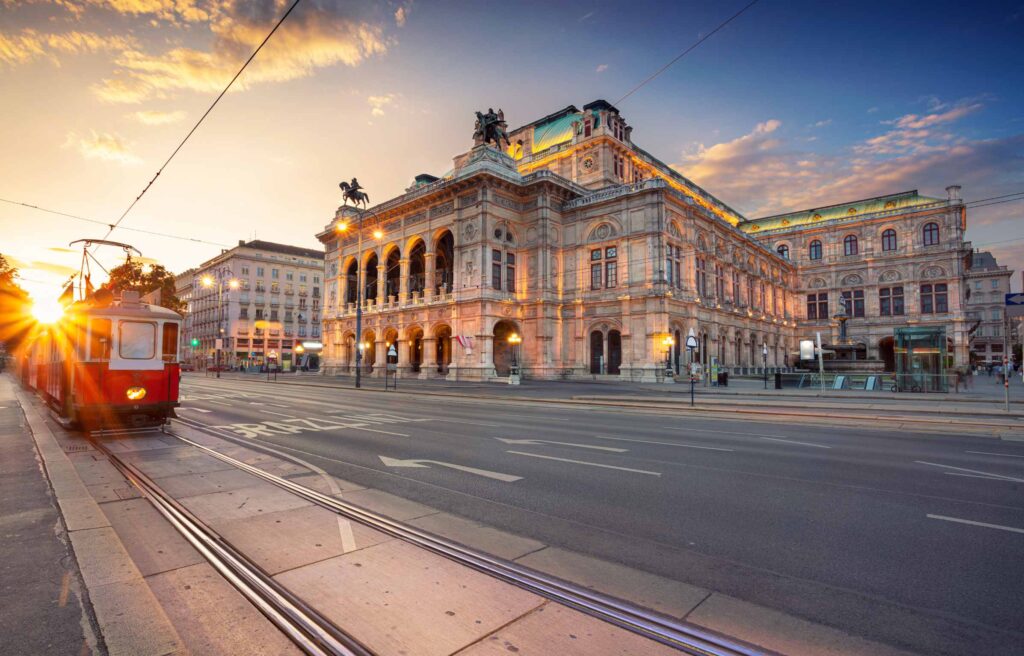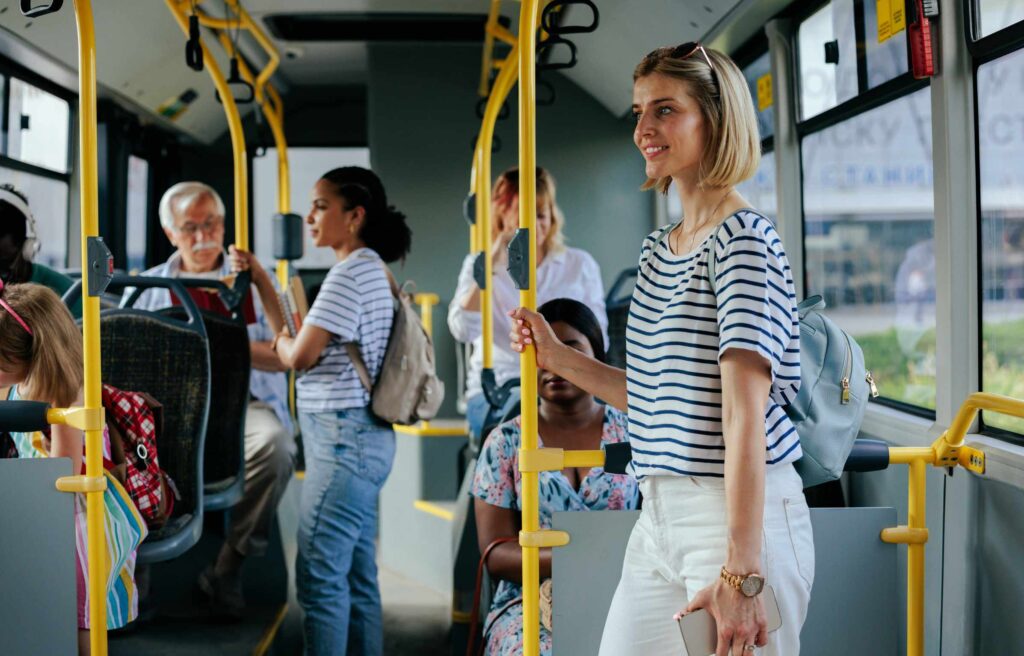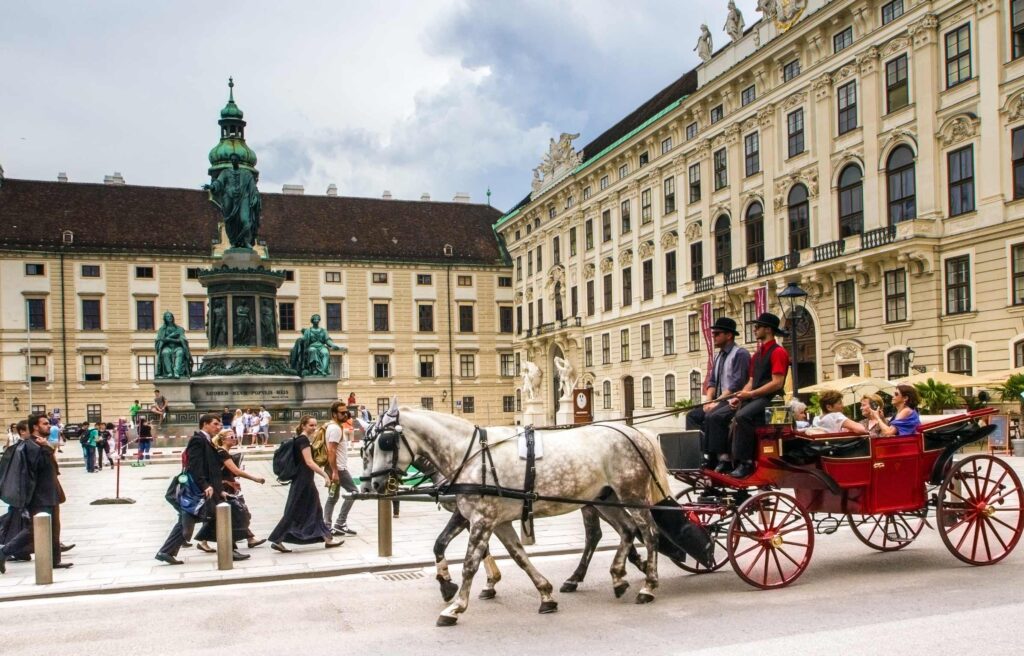Relocating to Vienna, a city of nearly 1.9 million residents, offers a well-structured move into one of Europe’s most refined and livable capitals. Known for its imperial architecture, thriving arts scene, and deeply rooted coffeehouse culture, Vienna is where classical heritage meets modern-day quality of life.
The city hosts over 100 museums, 23 districts with their distinct character, and a food scene spanning traditional Austrian fare to global cuisine. Vienna welcomes around 7 million international tourists annually, drawn to its clean streets, cultural depth, and stable environment.
According to Mercer’s Quality of Living Survey, Vienna consistently ranks first among world cities for overall livability.
Moving here requires planning, from knowing Viennese life to securing housing, schools, and key services.
This city guide will help you make every part of that process clear, practical, and efficient.
Interesting Facts About Vienna, Austria That You Probably Didn’t Know
Vienna is a city of precision, charm, and deep cultural roots. Behind its polished streets, the details still surprise visitors. Each district tells its own story, from imperial landmarks to quiet courtyards. This blend of history, design, and careful planning for anyone relocating to Vienna creates a timeless and thoughtfully built city.
Here are some fascinating facts that reveal what makes Vienna truly unique –
- Known as the “City of Music,” Vienna was home to legendary composers like Mozart, Beethoven, and Schubert.
- The city operates one of the world’s most efficient public transport systems, with over 900 million rides recorded annually.
- Vienna’s historic center is a UNESCO World Heritage Site, filled with imperial architecture, palaces, and baroque streetscapes.
- Vienna has over 2,000 parks and green spaces, covering over half of the city’s area.
- The Vienna State Opera stages over 300 performances per season and offers standing tickets for less than €10 to make culture widely accessible.
- The Central Cemetery (Zentralfriedhof) is one of the largest in Europe and is the final resting place of many famous artists, including Beethoven and Brahms.
- Vienna has been ranked the world’s most livable city multiple times by Mercer, thanks to its public safety, healthcare, education, and housing systems.
- While German is the official language, English is widely spoken in business, education, and tourism, making it easy for newcomers to adapt.
- The Naschmarkt, Vienna’s largest and most popular open-air market, has operated since the 16th century and features over 120 stalls.
What Is It Like to Relocate to Vienna?
Life in Vienna moves with quiet precision. The city offers a structured pace, systems function smoothly, and public spaces are cared for with intention. According to Stadt Wien, Vienna’s population in 2023 was 1,982,097, with 34.2% being foreign nationals and 39.3% being born abroad. By 2025, Vienna had reached an estimated population of 2,028,399. It feels both grand and grounded, mixing imperial history with modern planning.
Housing varies by district; central areas like Innere Stadt or Neubau typically command higher rents. Specifically, a one-bedroom apartment in the core can range from €950 to €1,300 per month. This is because these prices reflect access to historic architecture, museums, efficient transport, and vibrant public squares.
Moreover, public transportation remains one of Vienna’s greatest strengths. With an integrated network of subways, trams, and buses, daily commuting is fast and reliable. As a result, it encourages residents to live without cars and rely on clean, affordable options.
In addition, green areas shape daily life across the city. Parks, tree-lined boulevards, and riverside paths give residents room to breathe. Importantly, these spaces are not just decorations; they define how people live, rest, and move, an essential part of what makes relocating to Vienna so appealing.
Climate and Weather ⛅

The capital of Austria experiences a Central European climate that combines warm summers with crisp winters. Its seasons shape daily life, with open-air summers and calm, cozy winters. Vienna stays calm year-round. Tree-lined streets change with the seasons, and life moves steadily. Residents adapt easily, from summer cafés to winter walks.
Here is a quick look at Vienna’s climate through the seasons –
Summer (June to August)
Summer in Vienna is warm, with average daytime temperatures between 24°C and 27°C (75°F to 81°F). Occasional heat spikes can push temperatures past 30°C (86°F), especially in July. Extended daylight hours, up to 15 hours per day, encourage outdoor dining, river swimming, and open-air concerts. Rainfall averages 60 to 80mm, often in brief afternoon bursts. If you are relocating to Vienna, summer offers the perfect season to settle in and enjoy the city at its most lively.
Fall (September to November)
Fall arrives with cooler air and a color shift. Temperatures gradually drop from 20°C (68°F) in September to around 8°C (46°F) by November. Rainfall averages around 40 to 60mm (1.5 to 2.3 inches) per month, while winds become more noticeable in open areas. The city becomes quieter, with tree-lined avenues and parks showing deep reds and golds. Fall is ideal for cultural outings and slow-paced city walks under crisp skies.
Winter (December to February)
Winters in Vienna are cold but rarely severe. Typically, average temperatures range from -1°C to 4°C (30°F to 39°F). While snowfall occurs, it is usually light, adding a gentle layer over rooftops and city parks. Vienna’s charm intensifies during this season with Christmas markets, warm cafés, and festive decorations lighting up the early evenings. Although daylight shortens, winter brings a calm and inviting mood.
Spring (March to May)
As winter fades, spring in Vienna brings a gradual return to warmth. March begins around 5°C (41°F), climbing to 18°C (64°F) by the end of May. Meanwhile, rainfall remains moderate at 40 to 60mm (1.5 to 2.3 inches) per month, contributing to the city’s lush renewal. As a result, flowers bloom across parks and public gardens, and street cafés again fill with people. The town feels refreshed, and daily life takes on a lighter, more social rhythm.
Cost of Living in Vienna ?

The cost of living in Vienna depends primarily on lifestyle, district, and personal choices. While Vienna is generally more affordable than other major European capitals, such as relocating to Paris or Zurich, it offers one of the highest standards of living in the region. The strong infrastructure and culture of Vienna make it practical and enjoyable.
If you’re considering relocating to Vienna in 2025, here are some estimated expenses you can expect –
Housing
To begin with, renting a one-bedroom apartment in central districts like Innere Stadt or Neubau typically ranges from €950 to €1,300 per month. On the other hand, outer districts such as Donaustadt or Favoriten offer lower prices, averaging between €750 and €950. Moreover, since most rental apartments come unfurnished, you may need to budget for furniture, kitchen appliances, and initial setup costs.
Utilities
Monthly utility bills, including electricity, water, heating, and waste removal generally fall between €150 and €220 for an average 60 to 80 square meter apartment. However, these expenses can vary depending on the season and your usage. In addition, internet services are often not included in the rent and usually cost around €30 to €40 per month. Therefore, check contracts to see what is and is not omitted.
Transportation
Vienna offers one of Europe’s most affordable and efficient public transportation systems. A monthly transport pass costs approximately €51 and grants unlimited access to U-Bahn, trams, buses, and S-Bahn trains throughout the city. As a result, most residents rely solely on public transport. Austria’s national rail service (ÖBB) also provides special offers and travel passes for occasional regional travel.
Food
Monthly grocery costs for one person typically range from €250 to €350, depending on dietary preferences and shopping habits. Supermarkets like BILLA, HOFER, and SPAR offer local and international products. Meanwhile, eating out is reasonably priced, with meals at casual restaurants averaging €12 to €18. For comparison, dining at mid-range establishments may cost around €30 to €45 per person for a meal with drinks.
? Related – How Much Do Relocation Services Cost? Here is your guide
Community and Lifestyle in Vienna
Vienna is home to a diverse and growing population. Moreover, it boasts an international community that combines a rich blend of languages, traditions, and experiences. The city, meanwhile, balances order and comfort with clean spaces and strong infrastructure. As a result, Vienna consistently ranks high for quality of life, due to its strong healthcare, safety, and inclusion.
It supports an outdoor lifestyle grounded in wellness and community. Residents often spend weekends in the Prater, along the Danube, or in right neighborhood cafés that double as social gathering spots. Seasonal events like Christmas markets, open-air concerts, and district festivals keep the city’s cultural pulse active year-round.
Enjoying a café or joining a local event, life in Vienna moves with calm and connection.
Dining and Food Scene in Vienna ?

The food scene in Vienna blends imperial tradition with cosmopolitan flair. For instance, you can enjoy a melange in a grand café, then explore markets full of fresh produce and local flavors. Moreover, its culinary identity reflects its cultural depth. Rooted in history, shaped by global influences, and refined through precision, it delivers a unique and memorable experience.
Let’s take a closer look at the culinary culture and dining experiences Vienna brings to the table –
Local Cuisine and Food Culture
To start, Vienna is known for its refined and filling traditional dishes. Restaurants and local spots serve classics like Schnitzel, Tafelspitz, and Gulasch. For something sweet, Sachertorte and Apfelstrudel remain iconic, especially when enjoyed in a Viennese coffeehouse. These cafés are places to grab a drink and much more.
Popular Restaurants and Food Markets
The city’s best-known food market, with over 120 stalls offering everything from Austrian cheeses to Turkish pastries. If you’re interested in fine dining, Steirereck in Stadtpark ranks among the top restaurants globally, offering creative takes on local cuisine. For authentic comfort, visit Plachutta or Gasthaus Pöschl. Neubau and Leopoldstadt offer bistros, street food, and wine bars.
Grocery Shopping and Meal Planning
Vienna makes shopping simple. Supermarkets like BILLA, SPAR, and HOFER are well stocked with local and international goods. Meanwhile, outdoor markets such as Karmelitermarkt and Brunnenmarkt provide access to fresh, seasonal ingredients from local producers. Denn’s Biomarkt offers organic, vegan, and gluten-free options for specific dietary needs. Meal kits make it easy to cook Austrian dishes at home.
?♀️ Also read – Why Chase Sapphire Reserve Points on Dining Work Like Magic
Housing and Accommodation in Vienna
Vienna offers diverse housing, from historic apartments with classic charm to modern flats in newly developed districts. Each neighborhood brings its own atmosphere, allowing residents to choose between quiet green spaces or more vibrant central areas.
The housing market is steady and competitive. Vienna has over one million primary residences, with most properties available for rent. Since many apartments are unfurnished, including kitchens, you must invest in setup costs into your budget early on.
Rental prices vary by location. Inner districts like Innere Stadt and Neubau tend to be more expensive, while areas like Simmering or Ottakring offer more space for less. Act quickly, as landlords fill desirable listings fast.
Prepare documents like proof of income and registration to secure your home when relocating to Vienna.
Finding a Place to Live in Vienna
Finding a place to live in Vienna can be both exciting and stressful. Choosing the right place depends on your goals, budget, and timing. It is essential to approach the process with both clarity and flexibility. If you are relocating to Vienna, staying organized will help you avoid delays and secure a home that fits your lifestyle.
Here are a few key steps to guide your search –
- Set Your Priorities – Start by outlining what matters most to you. Consider location, monthly budget, apartment size, proximity to work or school, preferred district vibe, and lease duration. It helps you focus on listings that match your lifestyle without wasting time on unsuitable options.
- Use Multiple Resources – Next, search across a variety of platforms. Use local websites like Willhaben or ImmobilienScout24, contact real estate agents who know the market well, and ask colleagues or friends for recommendations. Expats share listings in forums, offering access to hidden rentals.
- Prepare Your Documents – Before reaching out to landlords, gather essential paperwork. It usually includes proof of income, a copy of your passport or ID, and sometimes a letter of reference from a previous landlord or employer. Having these ready shows seriousness and can speed up the application process.
- Stay Flexible and Act Fast – Remain open to compromise. If you need assistance, consider using Relo.AI relocation services to make your home search easier. We can help streamline the process and arrange a meeting to discuss your options.
Education and Schools in Vienna ?

It offers a well-rounded and accessible education system that supports learners from early childhood to postgraduate study. In addition, its academic tradition ensures all students have the chance to succeed. As a result, families relocating to Vienna find strong public, private, and university options for long-term educational planning.
Here’s an overview of the education landscape in Vienna –
Schooling Options – Public and Private School Options
Public Schools
- Schools in Vienna follow the Austrian national curriculum, which strongly emphasizes foundational learning, languages, and civic education.
- Public schools are tuition-free for Austrian residents and EU citizens, while non-EU families may pay minimal administrative fees.
- Many schools now offer bilingual programs, particularly in urban districts with high international populations.
Private Schools
- Private and international schools provide alternatives for families seeking more tailored or globally recognized education.
- These schools often offer International Baccalaureate (IB), British, or American curricula, including language immersion or multicultural programs.
- Tuition varies widely, with many international schools charging between €8,000 and €25,000 per year.
Example Data
Public Schools
- Literacy rate – 98%
- Student-teacher ratio – 12:1
- University placement rate – 70%
- Diversity – Over 40 nationalities represented in Vienna’s public classrooms
Private Schools
- Average tuition – €10,000 to €25,000 annually
- Global accreditations – Many hold recognition from the Council of International Schools (CIS) and similar bodies
- Extracurriculars – Rich offerings in music, Art, languages, and sports
- Average class sizes – 12 to 15 students per classroom
Higher Education Institutions
Vienna is a leading European higher education hub, hosting prestigious universities that attract students worldwide. Moreover, students pursuing academic research or applied studies benefit from affordable tuition, world-class faculty, and vibrant campus communities.
- University of Vienna – One of Europe’s oldest and largest universities, offering a wide range of humanities, science, and law programs.
- Vienna University of Technology (TU Wien) – Known for its engineering, computer science, and architecture excellence.
- Vienna University of Economics and Business (WU Wien) – One of Europe’s top business schools, offering bachelor’s, master’s, and MBA programs in English and German.
- University of Applied Arts Vienna – Focused on creative fields such as design, digital arts, fine arts, and architecture.
- Medical University of Vienna – A globally respected medical education and biomedical research institution.
Education Quality and Rankings
Vienna consistently earns recognition for its strong academic standards. The University of Vienna ranks among Europe’s top research institutions, and TU Wien is a leader in STEM fields. The city’s education system is supported by robust public funding, ensuring accessibility and quality for students at every level.
Besides, integrating modern technology and international collaborations in teaching helps Vienna remain competitive in global rankings. Parents and students benefit from transparent evaluation systems, teacher training, and regular curriculum updates aligned with European education standards.
Continuing Education and Lifelong Learning
Vienna promotes lifelong learning through various flexible programs for adults and working professionals. Universities frequently offer continuing education courses, including evening and weekend classes, certificate programs, and open university access.
Adult education centers like Volkshochschule (VHS) offer affordable classes in languages, technology, business skills, and the arts. Online platforms and government-funded training programs ensure that residents of all ages can access learning opportunities to improve their skills and personal growth.
The education system in Vienna supports individuals at every life stage, offering depth, accessibility, and international compatibility. It makes relocating to Vienna a confident choice for students and families seeking long-term academic success.
Transportation and Commuting in Vienna ?

Vienna offers a reliable and well-organized transportation system that supports the daily needs of residents and newcomers alike. If you travel by public transport, car, bicycle, or on foot, the city makes it easy to move around efficiently. For those relocating to Vienna, the smooth and accessible commuting options are a significant advantage.
Public Transportation
The public transportation network includes U-Bahn (subway), S-Bahn (suburban rail), trams, and buses. With over 1,000 kilometers of routes and nearly 2 million daily trips, public transport remains the preferred method of commuting. The system is clean, safe, and on time, with trains and buses running frequently throughout the day and night. A €51 monthly pass offers unlimited, affordable city travel.
Road Infrastructure and Driving
Roads are reliable, but most residents prefer not to drive. Parking in central districts can be limited and costly, with permit zones requiring registration. The road network gives smooth access to highways and regional trips. Ongoing infrastructure improvements help manage congestion during peak times and support more efficient traffic flow.
Biking and Walking Around the City
Cycling is a practical and increasingly popular way to get around Vienna. With 1,400 bike lanes, the city supports safe and direct routes for cyclists. Public bike-sharing services like WienMobil Rad make cycling even more accessible. Meanwhile, Vienna’s pedestrian zones and scenic paths encourage walking as an easy and enjoyable way to explore. Vienna encourages walking, from city streets to Danube paths.
Commuting Times and Efficiency
Commute times in Vienna are relatively short compared to other European capitals. On average, public transport journeys take 20 to 30 minutes, depending on the distance and time of day. Cyclists complete most cross-district trips in under 25 minutes. Walkers reach nearby spots in 10 to 20 minutes. Walking to nearby locations usually takes between 10 and 20 minutes.
Apps to Download for Living in Vienna ?

Relocating to Vienna becomes easier with the right apps that simplify daily routines and improve your experience. If you need to navigate public transport, order food, or communicate in a new language, these tools help you easily settle in and explore the city. They bring convenience to your fingertips daily and support a smoother transition into local life.
WienMobil (public transport app)
WienMobil is the official app of Wiener Linien, Vienna’s leading public transportation provider. It combines route planning, real-time schedules, and digital ticketing in one easy-to-use platform. This app is ideal for confidently and efficiently navigating U-Bahn, trams, buses, and city trains. The app lets you compare routes, get updates, and save your favorite locations.
?♀️ Key Features –
- Real-time transit info for subways, trams, buses, and S-Bahn
- Integrated trip planner with detailed maps and station data
- Digital ticket purchase and storage for contactless travel
- Accessibility features and route adjustments for smoother commuting
Lieferando.at (food delivery)
Lieferando.at is Austria’s leading food delivery platform, offering access to hundreds of local and international restaurants across Vienna. If craving traditional Austrian cuisine or something global, this app makes mealtime satisfying and straightforward. Furthermore, you can browse menus, track orders in real time, and enjoy convenient payment options all in one place. For those relocating to Vienna, it provides a reliable way to explore local food options while settling into a new routine.
?♀️ Key Features –
- Wide selection of cuisines and restaurant partners
- Secure payment options, including card, PayPal, and vouchers
- Real-time tracking from kitchen to doorstep
- Ratings, reviews, and delivery time estimates for smart ordering
ÖBB App (train services)
The ÖBB app is essential for intercity and regional train travel across Austria. Operated by Österreichische Bundesbahnen (Austrian Federal Railways), the app makes buying tickets easy, viewing platform information, and planning cross-border travel in just a few taps. Additionally, you can access special discounts, track train delays, and manage bookings directly from your mobile. For anyone relocating to Vienna, this app is handy when exploring nearby cities or planning weekend trips easily and confidently.
?♀️ Key Features –
- Train and bus timetables with real-time updates
- Easy seat reservations and ticket management
- Integrated journey planner across Austrian and EU transport networks
- Push notifications for service changes and delays
Google Translate
Google Translate is a must-have app when relocating to Vienna, especially during your first few weeks. While many people speak English, this app helps you easily understand menus, signs, and offline conversations. Additionally, you can save useful phrases for quick access during daily interactions. Moreover, its voice and camera translation features make real-time communication much easier in unfamiliar situations, which is particularly helpful for anyone relocating to Vienna and adjusting to a new language environment.
?♀️ Key Features –
- Instant text, voice, and photo translation in over 100 languages
- Offline translation for key languages, including German
- Phrasebook feature to save useful everyday expressions
- Real-time conversation mode for seamless interaction
Recreation and Entertainment in Vienna
To begin with, Vienna offers endless opportunities for leisure and discovery. With that in mind, over 100 museums, hundreds of parks, and a full calendar of cultural events help the city blend tradition and modern living easily. As a result, locals enjoy a steady rhythm of concerts, exhibitions, and seasonal festivities, making daily life more engaging.
For example, you might spend a quiet afternoon in Stadtpark, browse contemporary art at the Leopold Museum, or attend an open-air concert at Rathausplatz. Each experience adds to the city’s reputation for refined, accessible entertainment.
Furthermore, significant events like the Vienna Film Festival, Donauinselfest, and New Year’s Concert offer yearly highlights. For anyone relocating to Vienna, these activities provide a strong sense of place, connection, and inspiration.
Employment and Job Market in Vienna
The city’s stable economy, diverse industries, and commitment to innovation support finding a job in Vienna. Vienna’s low unemployment rate creates strong opportunities across established and emerging fields. Key industries driving employment include healthcare, manufacturing, IT, finance, and education. The city is also strengthening its role in green energy and sustainable development.
A combination of established institutions and fast-growing companies shapes Vienna’s workforce. As Austria’s economic center, Vienna hosts many multinational firms, NGOs, and European headquarters. The city’s skilled labor pool and bilingual talent make it attractive to international employers. Job seekers relocating to Vienna benefit from a high employment rate and strong workplace protections.
According to Statistik Austria, Vienna generates over 1 million job opportunities across sectors. With a GDP per capita nearing €55,000, the city maintains competitive salaries, robust benefits, and a healthy work-life balance, especially with Austria’s legal cap of 40 working hours per week.
Here’s an overview of the employment landscape in Vienna –
| Industry | Number of Jobs | Percentage of Total Employment |
| Healthcare | 180,000 | 18% |
| Manufacturing & Engineering | 160,000 | 16% |
| Information Technology | 140,000 | 14% |
| Finance & Insurance | 120,000 | 12% |
| Education & Research | 100,000 | 10% |
| Public Administration | 90,000 | 9% |
| Retail & Wholesale | 80,000 | 8% |
| Tourism & Hospitality | 60,000 | 6% |
| Creative Industries | 50,000 | 5% |
| Transportation & Logistics | 40,000 | 4% |
This breakdown highlights the broad employment base available to residents and newcomers, offering diverse career paths for anyone relocating to Vienna.
Job Outlook
Vienna supports a forward-looking job market with healthcare, technology, and manufacturing opportunities. For professionals relocating to Vienna, the city’s stable economy and growing industries provide a strong foundation for career growth.
Let’s explore the current outlook across key sectors –
Healthcare
Vienna’s healthcare sector continues to expand. With an aging population and growing demand for modern care, job opportunities remain strong in hospitals, clinics, and research institutions. Many positions offer long-term stability and competitive benefits, making the sector attractive for local and international professionals.
In-demand roles include –
- General practitioners and medical specialists
- Registered nurses and nursing assistants
- Medical researchers in biotech and pharma
- Public health advisors and policy professionals
Technology
The tech scene in Vienna is steadily growing. Startups and global companies are investing in digital infrastructure, creating jobs across development, data, and security. This growth supports innovation in fintech, mobility, and digital health sectors, expanding career paths for skilled professionals.
You will find key opportunities in –
- Software development across platforms
- Data analytics and business intelligence
- Artificial intelligence and machine learning
- Cloud Architecture and DevOps
- Cybersecurity and digital operations
Manufacturing and Engineering
Manufacturing in Vienna continues to grow, focusing on automation, sustainability, and innovation. Companies are adopting advanced production methods to improve efficiency and reduce environmental impact. This shift creates demand for engineers, technicians, and specialists in industrial design and intelligent manufacturing systems.
Employers actively seek skilled professionals in –
- Industrial automation and mechatronics
- Sustainable production and green energy
- Precision engineering and mechanical design
- Advanced materials and testing systems
In-Demand Roles in Vienna
If you are relocating to Vienna, consider these high-demand jobs –
- Software Developer
- Data Analyst
- Cybersecurity Specialist
- Registered Nurse
- Mechanical Engineer
- Research Scientist
- Financial Analyst
- Marketing Manager
- Project Manager
- Public Health Specialist
Language Note – English is standard in international roles, but learning German can open more doors and help you connect in everyday life.
Job Opportunities and Vienna’s Economy ?

You will be stepping into a city known for its elegance and culture, economic strength, and professional opportunities. As the capital of Austria, Vienna contributes a quarter of the nation’s GDP, with a metropolitan economy valued at over €110 billion. Its central location, reliable infrastructure, and highly educated workforce make it one of Central Europe’s most attractive business environments.
While the services sector leads the way, accounting for over 80% of economic output, Vienna still maintains a well-balanced economy that includes healthcare, public administration, education, research, finance, and advanced manufacturing. In addition, the city nurtures a growing startup culture, supported by government incentives and access to EU markets. For anyone relocating to Vienna, this diversity ensures a wide range of professional opportunities across traditional and emerging industries.
Moreover, foreign direct investment continues to grow, and Vienna is home to over 200 international headquarters and institutions. This includes key biotech, pharmaceuticals, digital solutions, and logistics players. As a result, its reputation for political stability and economic transparency further strengthens investor confidence.
Here are several insights into Vienna’s economic and employment landscape –
- Unemployment Rate – 5.8% (below the EU average)
- Key Industries – Healthcare, manufacturing, technology, finance, research, education
- Top Employers – Erste Group, Siemens, OMV, Vienna Insurance Group, Austrian Airlines
- Startup Ecosystem – Over 2,900 startups with growing activity in green tech, health tech, and mobility
So, what does this mean if you are relocating to Vienna? The city offers competitive job opportunities, strong legal protections for workers, and an international work culture shaped by a multilingual workforce.
If you are building a career in science, tech, public service, or business, Vienna provides the economic stability and quality of life that make professional growth sustainable.
Healthcare and Medical Facilities in Vienna ?

To begin with, Vienna prioritizes public health, offering a comprehensive and accessible medical system supported by some of Europe’s most respected institutions. Furthermore, the city features a vast network of public and private hospitals, specialist clinics, and community health centers. As a result, these facilities ensure timely and high-quality care for long-term residents and individuals relocating to Vienna.
Leading hospitals such as Vienna General Hospital (AKH Wien), Rudolfstiftung, and the private Döbling Private Hospital are known for their medical excellence and advanced treatment options. With over 40 hospitals and over 150 outpatient clinics across the city, Vienna provides broad healthcare coverage to meet general and specialized needs.
Austria ranks among the top European countries regarding healthcare access and patient satisfaction. The city benefits from a strong doctor-to-patient ratio, with approximately 5.2 doctors per 1,000 inhabitants. Besides, Vienna offers around 7.5 hospital beds per 1,000 people, reflecting its readiness to handle patient demand.
Here are four of the best hospitals in Vienna –
| Hospital Name | Address | Phone Number |
| Vienna General Hospital (AKH Wien) | Währinger Gürtel 18–20, 1090 Wien | +43 1 40400 0 |
| Rudolfstiftung | Juchgasse 25, 1030 Wien | +43 1 71165 0 |
| Döbling Private Hospital | Heiligenstädter Str. 55–63, 1190 Wien | +43 1 36066 0 |
| Klinik Favoriten (SMZ Süd) | Kundratstraße 3, 1100 Wien | +43 1 60191 0 |
How to find more information –
- City Health Portals – The Stadt Wien Health Services website offers detailed listings of public hospitals and clinics.
- Private Directories – Websites like MyHealthVienna and Doctify Austria provide private care options and doctor reviews.
In general, please note that the phone numbers listed above are for general inquiries. In case of emergencies, contact Austria’s emergency services by dialling 144, or alternatively, go directly to the nearest hospital.
Banking and Finances in Vienna ?
The banking and financial sector is central to Vienna’s economic strength. As Austria’s financial capital, the city is home to major institutions such as Erste Group, Raiffeisen Bank International, and Vienna Insurance Group. These institutions offer various services, from traditional retail banking and wealth management to corporate finance and insurance.
The city’s stable financial system and investor protections attract local and global capital. With over 250 banks and financial service providers operating in the metropolitan area, Vienna offers reliable options for individuals and businesses.
To begin with, Austria has one of Europe’s highest financial inclusion rates, with over 98% of adults holding a bank account. For this reason, those relocating to Vienna will find that opening a local account is straightforward and essential for managing housing, utilities, and salary deposits. Moreover, most banks offer English-speaking services and user-friendly online platforms to support newcomers.
Meanwhile, fintech and green finance sectors are also on the rise. Startups continue to emerge in digital payments, sustainable investing, and blockchain applications, supported by government incentives and policies that promote innovation.
Overall, for professionals or families relocating to Vienna, the banking sector offers stability and modern convenience, combining trusted institutions with growing digital solutions suited to an international population.
Recommended read – SoFi Bank Review: Never Go Back to Traditional Banking Again!
Things to Do in Vienna

Known as the “City of Music,” Vienna blends imperial grandeur with a vibrant contemporary scene. From baroque palaces to world-famous coffeehouses and seasonal festivals, the city offers a refined yet approachable charm.
Here are some popular things to do in Vienna –
- Visit Schönbrunn Palace – Explore this former imperial summer residence with over 1,400 rooms, manicured gardens, and panoramic city views.
- Tour the Hofburg Imperial Palace – Step inside Habsburg Vienna’s political and cultural heart. The Hofburg complex includes the Imperial Apartments, Sisi Museum, and the Austrian National Library, immersing visitors in centuries of dynastic power and European history.
- Admire Art at the Belvedere Museum – Home to Gustav Klimt’s iconic The Kiss, the Belvedere’s baroque architecture and world-class art collection attract over a million visitors annually.
- Relax at Stadtpark – Known for its golden Johann Strauss monument, Stadtpark is a favorite green escape in the center of Vienna. Locals and tourists enjoy its quiet trails, elegant bridges, and seasonal blooms throughout the year.
- Stroll Through the MuseumsQuartier – One of the world’s largest cultural complexes; the MuseumsQuartier hosts institutions like Leopold Museum and mumok.
- Attend a Performance at the Vienna State Opera – Watch world-class opera or ballet in a venue that stages 300 performances annually.
- Discover Naschmarkt – Sample international flavors at Vienna’s most famous open-air market. From fresh produce to gourmet cuisine, over 120 stalls reflect the city’s culinary diversity and offer a lively atmosphere from day to night.
- Take a Danube River Cruise – See Vienna from the water with a scenic Danube cruise. If you are on a short city route or a longer journey through the Wachau Valley, the view of Vienna’s skyline and bridges adds a unique perspective to your visit.
Safety and Crime Rate in Vienna
To start, Vienna is widely recognized as one of the safest capitals in Europe, offering a secure environment for both residents and visitors. In fact, the city consistently ranks high in global safety indexes, with a crime rate significantly below the EU average. With around 3,000 reported incidents per 100,000 people, Vienna’s public spaces remain calm, well-monitored, and easy to navigate.
Moreover, clean, well-lit streets and a visible police presence contribute to a strong sense of order and personal safety. In addition, public transportation is reliable and secure, even during late hours, which makes commuting across districts worry-free for those relocating to Vienna.
In addition, Vienna’s strong community culture plays a key role in creating a sense of trust and social cohesion. Locals are known for being respectful and helpful, which adds to the city’s welcoming atmosphere. A quiet neighborhood or walking through the city center, most people find Vienna safe and comfortable at any hour.
The Best Places to Visit in Vienna

Vienna is a city where history lives alongside elegance and creativity. It is known for its imperial architecture, deep cultural roots, and refined pace of life. For anyone relocating to Vienna, exploring these iconic locations helps you connect with the rhythm and character of the city.
Here are the best places to visit in Vienna –
- Schönbrunn Palace – This former imperial summer residence features lavish rooms, beautifully landscaped gardens, and panoramic city views. It offers a complete introduction to Austria’s royal legacy.
- Belvedere Palace – Split into Upper and Lower buildings, this baroque masterpiece houses world-class art, including Gustav Klimt’s The Kiss. The grounds are equally stunning and perfect for an afternoon walk.
- St. Stephen’s Cathedral (Stephansdom) – Located in the city’s heart, this Gothic cathedral is one of Vienna’s most iconic landmarks. Visitors can climb the south tower for a sweeping view of the city skyline.
- Prater and the Giant Ferris Wheel – This historic amusement park features Vienna’s famous Riesenrad (Giant Ferris Wheel). It’s an ideal spot for families, joggers, and anyone seeking a relaxed outdoor escape.
- Naschmarkt – A lively market with 100 food and spice stalls. You’ll find everything from Austrian delicacies to international street food. Great for lunch or browsing weekend produce.
- Albertina Museum – Home to over one million prints and drawings, including works by Dürer, Picasso, and Monet. The museum is housed in a former Habsburg palace, blending Art with grandeur.
- Vienna State Opera (Wiener Staatsoper) – One of the world’s most prestigious opera houses, offering performances almost every night. Tours are also available for those interested in its rich history and architecture.
- Kunsthistorisches Museum – This fine arts museum is one of the largest in Europe. Its vast collection includes Egyptian antiquities, Renaissance art, and the world’s most extensive Bruegel collection.
Take the Guesswork Out of Relocating to Vienna with Us
Relo.AI helps you turn a complex move into a clear, step-by-step transition. If you are relocating to Vienna for work, family, or a long-term lifestyle change, we guide you with a straightforward approach that removes uncertainty and cuts delays.
Many newcomers struggle with confusing rental markets, registration requirements, and essential service setups. We help you avoid gaps with local support, from choosing the right district to understanding housing, healthcare, and documentation.
Our support covers everything from school timelines and lease agreements to transit passes and utility activation. You avoid the frustration of last-minute changes, missed appointments, and costly missteps with reliable, human-centred assistance.
Book a FREE session with us before you make your move. You’ll get a tailored plan, helpful checklists, and insight into settling quickly and confidently.
We will make your move to Vienna practical and clear so you can focus on living and not catching up.
Bring It All Together!
Relocating to Vienna places you in a clean, organized, and welcoming city. With a strong infrastructure, cultural richness, and steady opportunities, it is a destination built for long-term satisfaction. Use this guide as your starting point to prepare and transition with clarity and confidence. The systems work, the streets feel safe, and daily life follows a calm, reliable rhythm.
There is a space for every lifestyle, from quiet districts to lively cultural quarters. Vienna stays steady and gives you room to settle, grow, and live well.










